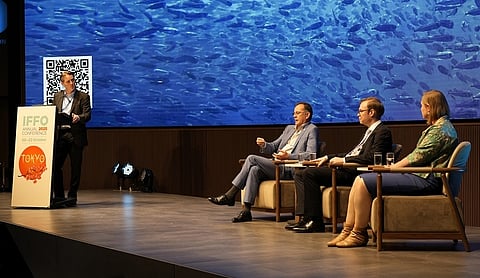

A moment from IFFO's Annual Conference held October 20-22 in Tokyo, Japan.
Photo: IFFO.
After three days of sharing information on market trends, technical innovation, and sustainability updates, IFFO, The Marine Ingredients Organisation, yesterday closed its annual conference, which in 2025 was held in Tokyo.
Against a backdrop of geopolitical tensions, climate uncertainty, and shifting trade dynamics, industry leaders and scientists gathered to reaffirm their commitment to evidence-based decision-making and emphasize collaboration.
Open to both IFFO members and non-members interested in the marine ingredients value chain, the conference—held for the first time in Tokyo, Japan, from October 20 to 22—addressed trends in the supply and demand of these ingredients and developments in the wider value chain.
The program included presentations and panel discussions with Robin Harding from the Financial Times, Manuel Barange from the UN's Food and Agriculture Organization (FAO), and Darian McBain, Outsourced Chief Sustainability Officer Asia, as well as specialized discussions to explore the aquaculture feed ecosystem, challenges and opportunities related to geopolitics, regulations, trade patterns, and climate change.
Other speakers include Oscar Tjakra from Rabobank; Christopher Free from the University of California, Santa Barbara; Hikaru Kondo from Kanematsu; Thue Barfod from Maersk; Richard Bazinet from the University of Toronto; Olivier Decamp from INVE Benchmark; Christian Meinich from Holtermann; and Aldo Bernasconi from GOED.
Thus, at the close of this 2025 edition, The Marine Ingredients Organisation emphasized the collaboration and analysis of the global context carried out during the three days of the conference in Tokyo.
IFFO added that a central theme of the conference was the critical role of industry in supporting effective fisheries management measures. Likewise, the conference also addressed the growing need for realism in how aquafeed ingredients are assessed.
"As the sector evolves and objective facts are gathered, the narrative is shifting: responsible sourcing—rather than the simplistic binary of marine versus plant origin—is a key requirement for ingredient selection. This marks a significant turning point in how sustainability is defined and measured across the value chain," said IFFO's Director General, Petter M. Johannessen.
Moreover, the organization added that life cycle assessment (LCA)—a scientific methodology that assesses the environmental impact of a product, process, or service throughout its entire life cycle, from the extraction of raw materials to manufacturing, use, and final disposal— remains a priority approach for the sector, with its holistic methodology offering a robust framework for evaluating environmental impacts across all areas in the value chain.
Earlier this year, in May, IFFO brought its members together for a three-day workshop held in Madrid, Spain. Scientists and industry experts gathered to explore the latest advances in feed ingredients, feed formulations, and the growing strategic role of marine ingredients.
There, along with country and regional analyses, the workshop featured updates on agri-commodities, fish oil, fishmeal, insect-based ingredients, and omega-3. In addition, two side events addressed precision nutrition and certification programs.
A year earlier, after assessing the range of protein ingredients available for aquaculture feed, an IFFO-led study had highlighted the "urgent need" for greater volumes of new aquafeed protein sources.
The Marine Ingredients Organisation, which, along with 45 other organizations, has just been recognized by the FAO for its "outstanding contributions to sustainable fisheries and aquaculture," took advantage of the event closure to announce that conversation will continue at its 2026 annual conference to be held in Buenos Aires, Argentina, from October 19 to 21.
